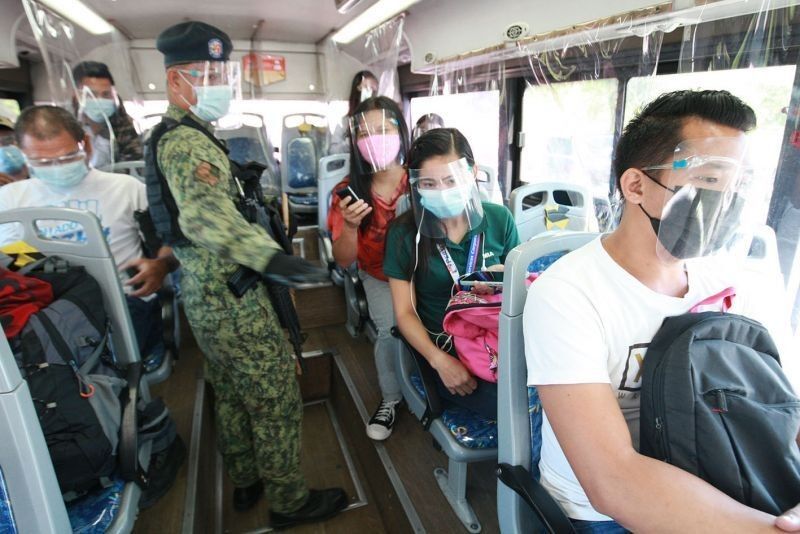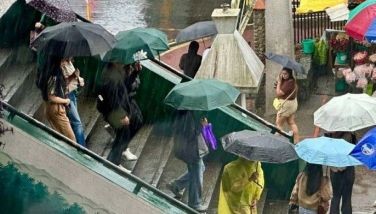'Shotgun approach': NGOs hit 'no vax, no ride' policy on public transportation

MANILA, Philippines — Banning the unvaccinated from using public transportation is a "shotgun approach" that will only inconvenience commuters instead of addressing the coronavirus surge in Metro Manila, transport advocacy groups said Thursday.
This comes a day after the DOTr announced the "no vaccine, no ride" policy in the capital region's modes of public transportation "to prevent a repeat of the public transport shut down [and] safeguard those that are most at risk." It said those affected can "use other modes" instead.
In a statement sent to media, the Move as One Coalition said that the move "unduly burdens commuters and transport workers and fails to address more basic issues" — such as the lack of ayuda, testing, and ventilation in public transport and public spaces — that also cause the spread of the pathogen.
The transport advocacy group urged the national government's coronavirus task force to instead allow more public transport units to ply their routes while ensuring these units have proper ventilation to prevent COVID-19 transmission — which a government adviser has said is largely airborne.
"The policy will further burden weary commuters who already struggle to ride limited public transport and have no other way to travel...Excluding them from public transport would prevent them from going to work, earning a living, and feeding their families," the coalition's statement reads.
"Because the government has failed to budget enough ayuda under the 2022 budget, many families will be left suffering and hungry because of this policy."
READ: 'No vaccine, no ride' on public transport panned as impractical, violative of rights
'Impractical and cumbersome to enforce'
Under the Order, the department said that violations of the policy are considered violations of applicable general safety and health provisions under any concession or service agreements, authority or permits to operate of public transportation, and other similar instruments.
According to Move as One co-convenor and transport economist Robert Siy, the policy "sets up drivers and operators for more harassment by enforcers, especially where the supply is far short of demand" while authorities "cannot expect drivers to be checking vaccination cards of all passengers especially during rush hour."
In a separate interview aired over GMA's Unang Balita, Ric Rivera of Pilipino Society and Development Advocates Commuter-Consumer said that the policy may only force commuters to resort to colorum vehicles.
"Better we really entice our PUVs. Do not limit them. Because they already have special permits and franchises. It would help us more," he is quoted as saying in Filipino in a report by GMA News Online.
Even Transportation Undersecretary Artemio Tuazon Jr. admitted at a press briefing Wednesday morning admitted that the burden of the policy is on drivers and operators who will have to check if each passenger is able to present a vaccination card before allowing them to board.
But months before the policy was even conceptualized, jeepney drivers said that checkpoints set up for enforcers to check on the observance of minimum public health standards only intimidated drivers with aggressive enforcement, forcing some to stay at home instead out of fear of operating at a loss. This only meant less transport options for the commuting public, they said.
READ: In ECQ 'bubble', checkpoints for commuter safety harm hard-up drivers
"If unvaccinated workers are not allowed on public transport to get to work then it is tantamount to being a requirement for work," Pagkakaisa ng Manggagawa sa Transportasyon convenor Dante Lagman told Philstar.com earlier.
"Malls [are] not essential but commuting [is] extremely essential...there’s really a violation of the right to mobility. We are exempted as consumers, but we are not exempted as workers. That just means you can buy, you can go out if you want to spend, but not if you want to work and earn," The Passenger Forum convenor Primo Morillo also told Philstar.com.
DOTr apologizes for inconvenience but stands behind policy
In a series of Viber messages sent to reporters Thursday morning, Transportation spokesperson Goddess Libiran apologized to the public for the inconvenience but highlighted that the DOTr was implementing the policy "to stem the surging cases of COVID-19."
"If we do not act now, all industries and business sectors will be severely affected because of the rise in the number of people with infection," she said.
She also took care to highlight that the Metro Manila Council already issued a similar resolution that also "prohibits unvaccinated individuals from boarding public transport."
Resolutions from the Metro Manila Council require local government units to issue local ordinances to be implemented in their localities and are not binding.
"We believe that it is more anti-poor and anti-life if we will not impose interventions that will prevent loss of life due to non-vaccinations," the DOTr's statement reads. "We would also wish to ensure the public that the implementation of the said policy will be both tolerant and firm."
As of this writing, only 67.8 percent of Metro Manila residents are fully vaccinated. Transport and human rights groups continue to call for better access to vaccines instead of punishments for the unvaccinated.
"The policy fails to address the current inequity in COVID-19 vaccine access in the Philippines. Many commuters — especially those who come from the provinces and travel to, from, or within Metro Manila — do not have access to vaccines," Siy said.
"If the policy’s objective is to encourage more people to get vaccinated and to address vaccine hesitancy, there are other less punitive and more humane ways of achieving this goal," he added, suggesting monetary incentives and information campaigns to address vaccine hesitancy.
According to data from the Japan International Cooperation Agency, 88% or almost nine out of ten households in Metro Manila do not own private vehicles and have to rely on public transportation.
The ban, which covers all modes of public transportation to and from Metro Manila, is set to take effect on Monday, January 17.
- Latest
- Trending































